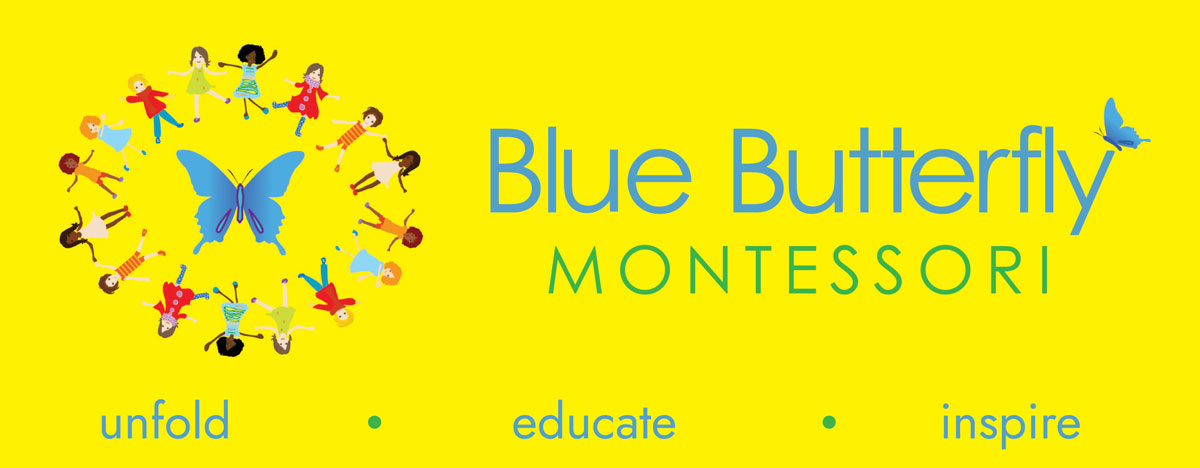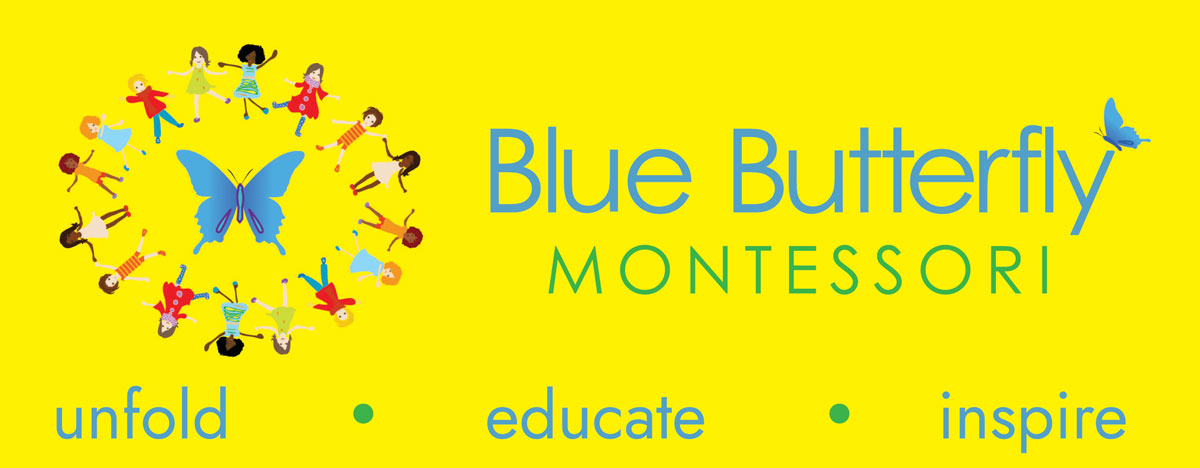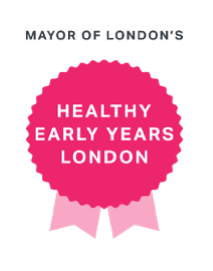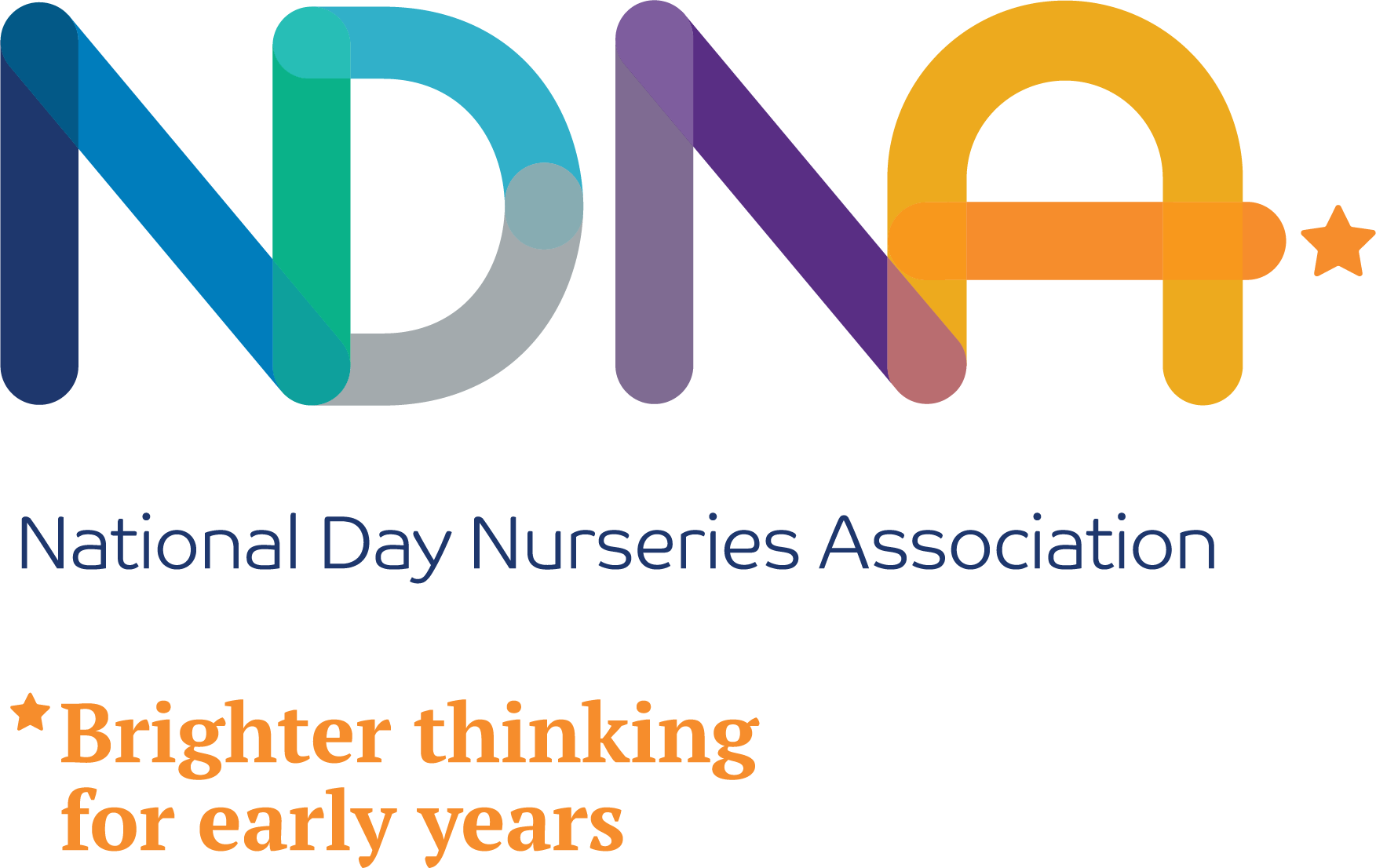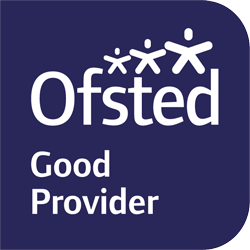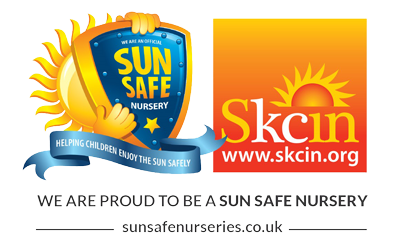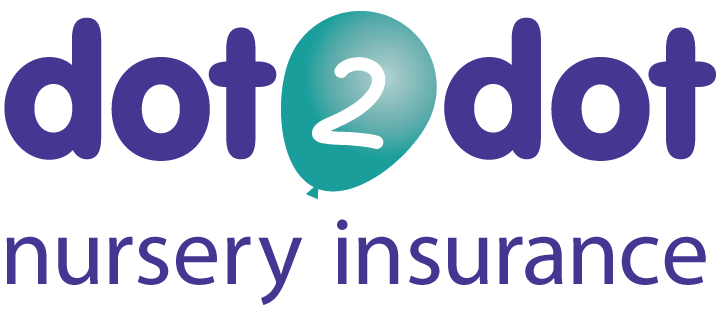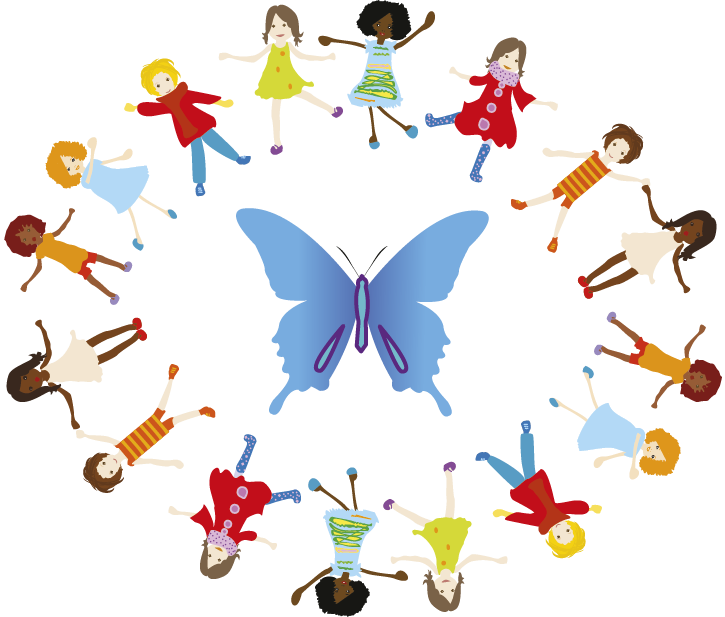The Montessori Curriculum
The Montessori approach which has been used successfully for over a hundred years, seeks to provide organised play as a means of promoting specific skills and concepts and is very much at one with the EYFS view of learning. In particular, both see observation of children as central to promoting their learning and development.
The learning environments presented by Blue Butterfly Montessori are structured and organised in such a way that children learn through all the senses.
Our Montessori curriculum identifies six key areas of activity which encompass the six areas of learning and development identified and accepted in the EYFS (Early Years Foundation Stage).
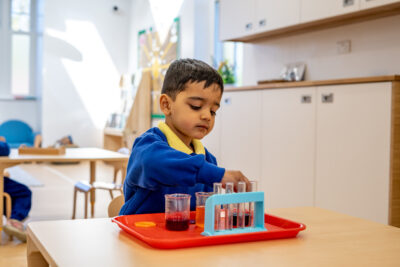
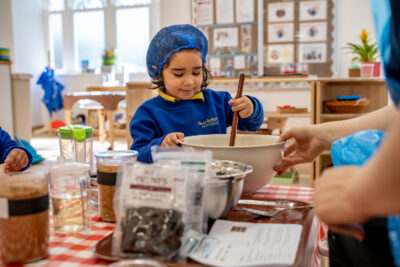
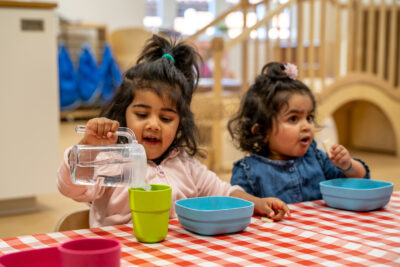
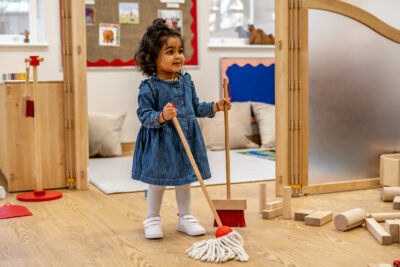
Practical life activities are designed to teach children life skills. The basic principle behind these exercises is that they are transferable into reality. By learning these skills, the child become more independent, improves his/her eye hand co-ordination fine motor skills, precision of movements, strengthen hand muscles and most importantly practice concentration as well as indirectly preparing children for writing.
Grace and courtesy lesson are given by modelling behaviour as well as by role playing. Children learn how to dress up by themselves, how to do self – care, prepare food, tidy up and help others. With practice and eventually mastering certain skills comes greater confidence, giving them the internal foundation to believe in themselves with the realisation that they can conquer any task through repetition and perseverance.
(Interlinks with the EYFS- Personal, Social & Emotional Development)
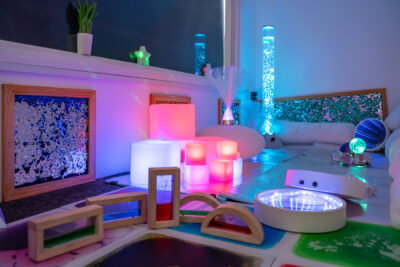
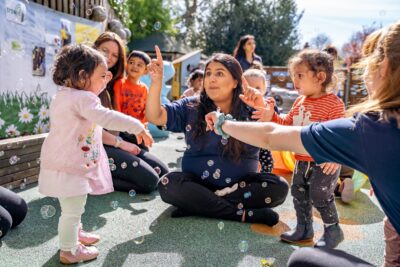
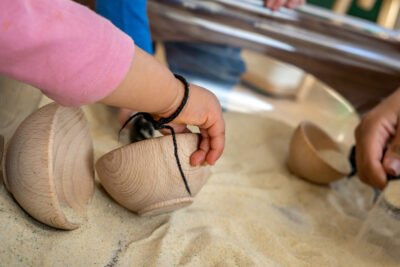

Dr Maria Montessori believed that our intellect and knowledge of the World begins with our sensorial experiences. Children learn through their senses and all the materials in a Montessori environment provide learning through touch, taste, smell, sight, hearing or hands-on manipulation.
Children can learn about different textures and materials, using them to create their own patterns and designs through their environment and can then begin to understand their surroundings. Sensorial materials help children to discriminate between and match shapes, sizes, colours, sounds and smells. It also involves their abstract thinking and helps them to get ready for Mathematics.
(Interlinks with the EYFS- Expressive Arts & Design)
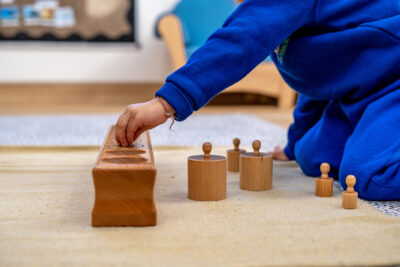
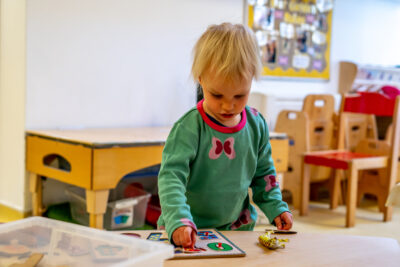
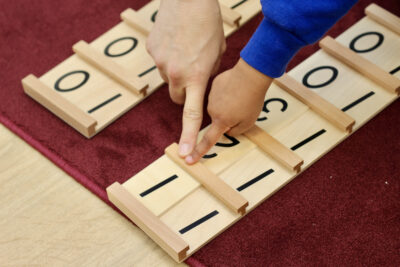
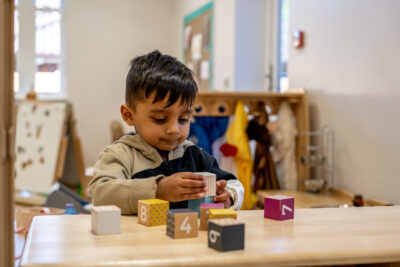
Dr Maria Montessori realised that all children have a “Mathematical Mind” and that when they are given the opportunity to explore math in a concrete way, through “hands-on” materials, abstract math concepts become easier to comprehend. All Montessori Mathematics materials are based on abstract concepts and create concrete sensorial learning materials that children use first with guidance from Teacher and then independently.
Initial explorations with sensorial materials encourage children to understand basic maths concepts such as learning number recognition, counting, and sequencing of numbers. Sensorial work prepares the child for a more formal introduction to mathematics, and the introduction of abstract mathematical concepts such as the decimal system and mathematical operations. Montessori educated children leave the class with genuine love of numbers and mathematics.
(Interlinks with the EYFS– Mathematics)
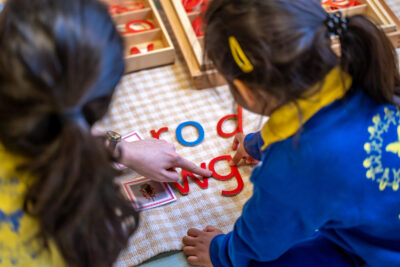
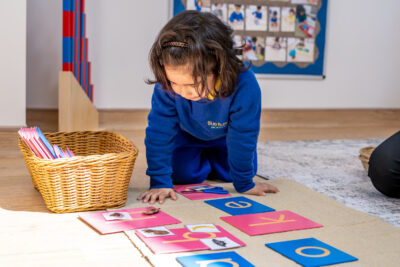
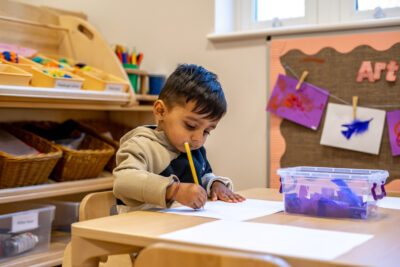
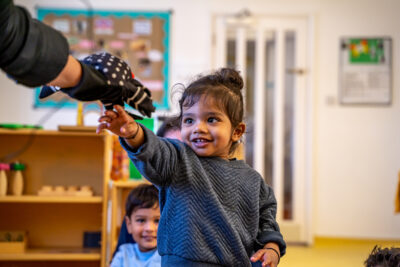
There are a lot of opportunity for children to enrich their language and improve communication with their peers and adults. We emphasise the development of vocabulary based on real experiences and building foundation for writing and reading through using Montessori materials such as tracing sandpaper letters, movable alphabet, writing in sand, using special metal insets to encourage tripod grip.
Children are introduced to language through phonetic approach and sounds games which builds a strong foundation to process word building and then blending sounds into meaningful words.
Teachers also encourage language development through regular book reading. Visits to our nursery library, show and tell, variety of subjects related to weekly themes all enhance vocabulary but also the child’s knowledge and understanding about the world.
(Interlinks with the EYFS- Communication & Language/ Literacy)
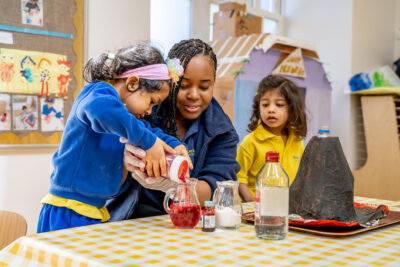
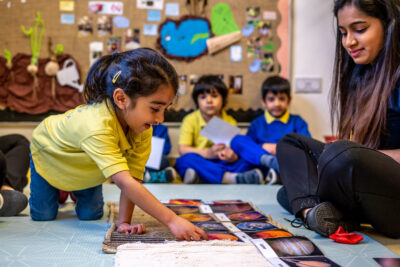
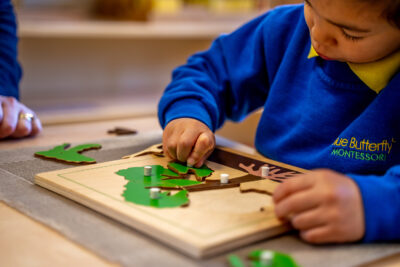
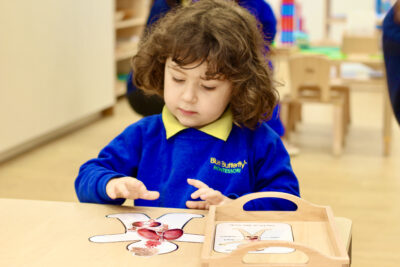
The Montessori approach covers a wide range of subjects which reflect the broad interests of young children. Using materials that reflect different cultures and beliefs from around the world helps children to develop a cosmic education and to become citizens of the modern world. Cultural activities lead the child to experience music, stories, artwork and items from the child’s community, society, and cultural background.
The areas of geography, science, zoology, and botany are all included in this area. A range of globes, puzzle maps and folders containing pictures from different countries promotes an international view that embraces the need to understand different peoples, ethnic groups, and religions.
(EYFS – Understanding the World)
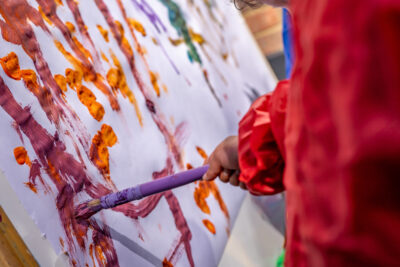
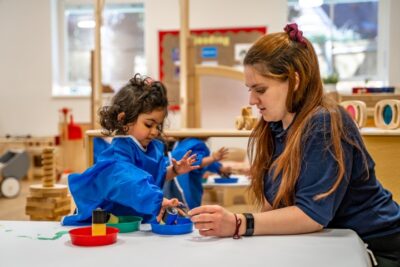
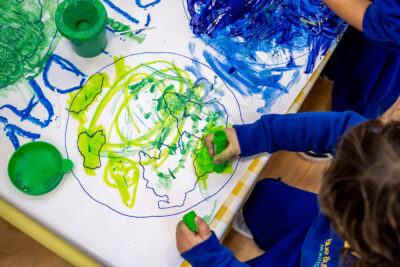
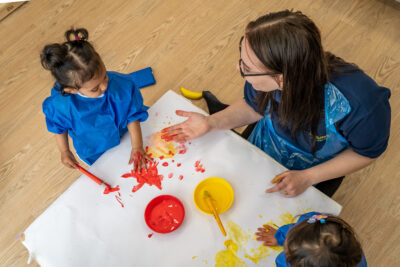
Children have access to art materials and use art easel every day to express their creativity. We introduce children to the Artist of the month where they learn about famous paintings and different styles as well as able to interpret with their own eyes.
(EYFS – Expressive Arts and Design)
The Montessori Method
“The most important period of life is not the age of university studies, but the first one, the period from birth to the age of six”
Maria Montessori
These words ignited our mission: to establish a space where children can realize their full potential and acquire skills essential not only for academic success but for lifelong fulfilment.
At Blue Butterfly Montessori we embrace the innovative and transformative Montessori Method pioneered by the visionary educator Maria Montessori. At the heart of our approach lies a profound respect for each child’s unique journey of development and an unwavering belief in their innate potential to flourish given the right environment and guidance.
Maria Montessori
Maria Montessori, born in 1870, was a woman ahead of her time. As the first female physician in Italy, she defied societal norms and pursued her passion for education, eventually revolutionising early childhood pedagogy.
Montessori’s insights were deeply rooted in her observations of children, whom she regarded as natural learners with boundless potential. Through her ground breaking work, she developed a profound understanding of child development and the importance of providing an environment that supports each child’s unique needs and interests.
Throughout her life, Maria Montessori advocated tirelessly for the rights of children and the transformative power of education. Her legacy continues to inspire educators around the world, shaping the way we nurture and educate young minds in the 21st century.
Understanding the Montessori Method
The Montessori Method is not just an educational approach; it’s a philosophy that recognizes children as active participants in their own learning process. Developed by Dr. Maria Montessori, an Italian physician, educator, and innovator, this method is grounded in the principles of respect, independence, and hands-on learning.
Central to the Montessori philosophy is the idea that children are inherently curious and possess an intrinsic desire to explore and understand the world around them. Rather than imposing a fixed curriculum, Montessori education fosters an environment where children are free to follow their interests, make choices, and engage in self-directed activities at their own pace.
Key Principles of the Montessori Method
- Child- Centred Learning- In a Montessori classroom, the child is at the center of the learning experience. Teachers serve as guides, observing each child’s interests and abilities and providing tailored support and materials to facilitate their growth and development.
- Prepared Environment- Montessori classrooms are thoughtfully designed to promote independence, order, and exploration. They are equipped with carefully selected materials that are developmentally appropriate and encourage hands-on learning.
- Mixed- Age Grouping- Children in Montessori classrooms typically span a range of ages, allowing for natural peer learning and collaboration. This fosters a sense of community and encourages older children to mentor and support younger ones.
- Freedom within Limits- While children are encouraged to pursue their interests and work independently, they also learn to respect boundaries and guidelines established by the classroom community. This balance of freedom and responsibility cultivates self-discipline and mutual respect.
- Holistic Development- Montessori education emphasises the holistic development of the child, addressing not only academic skills but also social, emotional, and practical life skills. Activities are designed to promote critical thinking, problem-solving, and creativity, nurturing well-rounded individuals.
Embracing Montessori Education at Blue Butterfly Montessori
At Blue Butterfly Montessori, we are proud to embrace the Montessori Method, providing a nurturing environment where children can thrive and discover the joy of learning. Guided by Maria Montessori’s principles, we strive to create a space where curiosity is celebrated, independence is fostered, and every child is empowered to reach their full potential.
Join us on this exciting journey of discovery and growth, where each day is an opportunity to ignite a lifelong love of learning in the hearts of our young learners.
